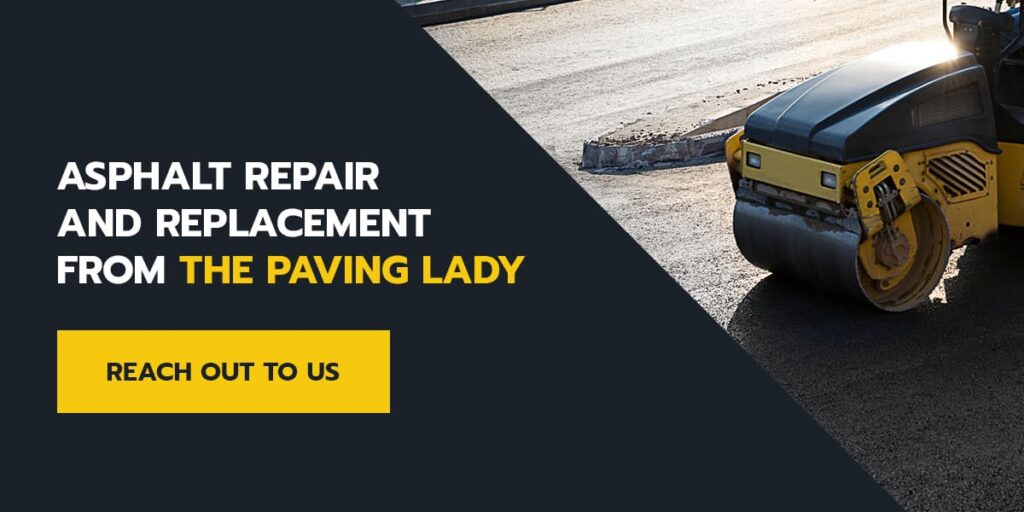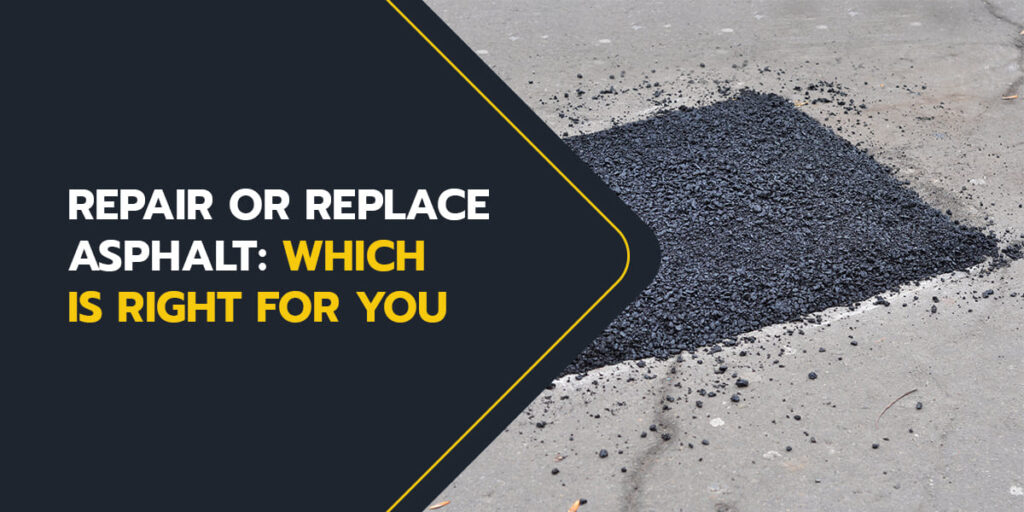
Repair or Replace Asphalt: Which Is Right for You
If your parking lot or other asphalt space is looking a little worse for wear, you might be wondering what your options are. Depending on the extent of the damage and the age of your surface, you could do anything from applying temporary patches to replacing the entire thing. These popular options — asphalt resurfacing, patching and replacement — have their place in different situations, and choosing the right one is key to maximizing your investment and property.
See how these options compare and how to choose the right method for your asphalt.
When to Choose Asphalt Patching
For minor repairs, asphalt patching can be a cost-effective option. It’s the easiest and least expensive method, but it is only suitable for small divots, cracks and holes. Anything large or extensive usually signifies foundational damage that will need more complex repairs, like resurfacing or replacing the pavement. If your surface has small, shallow cracks, you can often save it with patching. If they’re small enough, a crack-filling compound is often all that is needed to fix them.
Small to moderate cracks can usually be fixed by milling away the top layers of the cracked section, cleaning out the hole and pouring new asphalt. Workers then compact the asphalt and level it off for a shiny new blacktop surface. If the cracks are more severe, workers can perform dig-out patching, in which they remove the entire section of failed asphalt and install a new one. It’s a little more complex, but it provides a sturdy solution.
Asphalt patching won’t be the most aesthetically pleasing solution, but it gets the job done and prevents further damage.
Pros, Cons and Cost of Asphalt Patching
The benefits of asphalt patching are its cost and simplicity. It’s by far the cheapest option and can help you preserve your investment and prevent further damage. It’s also fast, meaning minimal business disruptions.
As with most quick fixes, asphalt patching is only suitable for minor cracks. If you need to cover a large area, asphalt patches won’t do the trick. Another negative aspect of asphalt patching is its potential for inconsistency. Asphalt patches won’t necessarily blend in with the surrounding pavement and may create a less attractive end result. They could also create a small bump on the surface which might be frustrating for drivers.
When to Choose Asphalt Resurfacing
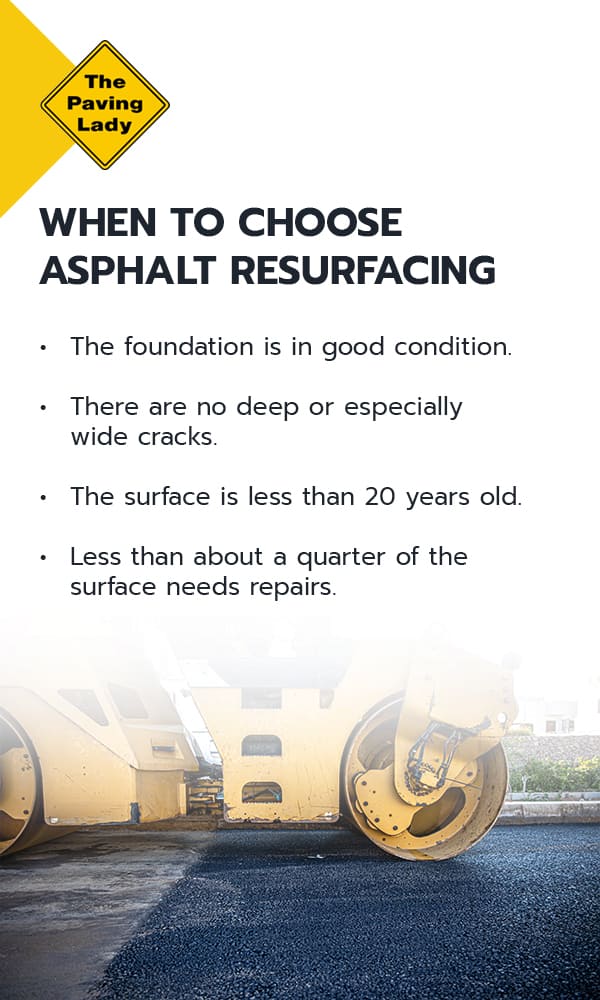
Asphalt resurfacing is the middle ground between light-duty asphalt patching and the more extensive replacement options. In this process, workers mill the asphalt down to remove the top layer. Then, they repair any damage in the pavement below the asphalt. They might insert asphalt into deep cracks, for instance. After pavement repairs, workers even out the surface and apply all-new asphalt. This way, you can keep the existing foundation intact and just replace the part that needs it.
You can generally only resurface asphalt driveways and lots if:
- The foundation is in good condition.
- There are no deep or wide cracks.
- The surface is less than 20 years old.
- Less than about a quarter of the surface needs repairs.
If your surface meets all those conditions, resurfacing is a great way to extend the life of the asphalt. It also looks smooth, with no awkward edges or colors. This solution is practical and offers a cost-effective approach for covering a large surface area. If you have a lot of problems spread out across the surface, even if they’re not deep, it may be easier and more convenient to take the resurfacing route.
Another reason to go for this asphalt repair option is if you’re looking for an update. Adding a new top layer of asphalt is enough to give you a new surface feel without the price of a complete replacement. It can be an excellent choice for boosting your curb appeal or refreshing the property’s look.
Pros, Cons and Cost of Asphalt Resurfacing
Asphalt resurfacing options are a great choice in certain situations. If your lot fits the bill, you can enjoy benefits such as:
- Practicality: A whole new lot is nice, but it’s also costly. Asphalt resurfacing is faster and more cost-effective. Plus, you’re building on the investment you’ve already made on your existing surface. Assuming your foundation is still nice and sturdy, you get to make use of all the value it still has to offer.
- Better curb appeal: When we look at patching vs. resurfacing, resurfacing offers a neater, cleaner look. It can boost your curb appeal and help freshen up a property’s appearance. It avoids the patchy look and gives you a brand-new top layer of asphalt.
- Extended lot life span: Even if your surface is starting to deteriorate, blacktop resurfacing options can make it last a lot longer. You can prolong the time it will take before you need to undergo a more costly replacement and maximize the value of your previous investment.
- Affordability: Asphalt resurfacing is much more affordable than an entire replacement, so if you have a tight budget, it might be more attainable. But if you just have a few cracks to fill, it could still be better to patch. Keep in mind that resurfacing asphalt can help you minimize repair needs in the future.
One potential downside to asphalt resurfacing is that it is dependent on a strong foundation. If your foundation isn’t strong, a resurfaced lot will start to show signs of structural damage. It might create cracks or potholes and could lead to further, continuous repairs that reduce the major benefit of resurfacing, which is extending the life span of a lot.
The cost of resurfacing can vary widely by location, materials and lot characteristics, but it is cheaper than an entire replacement and more costly than patching.
When to Choose Asphalt Paving Replacement
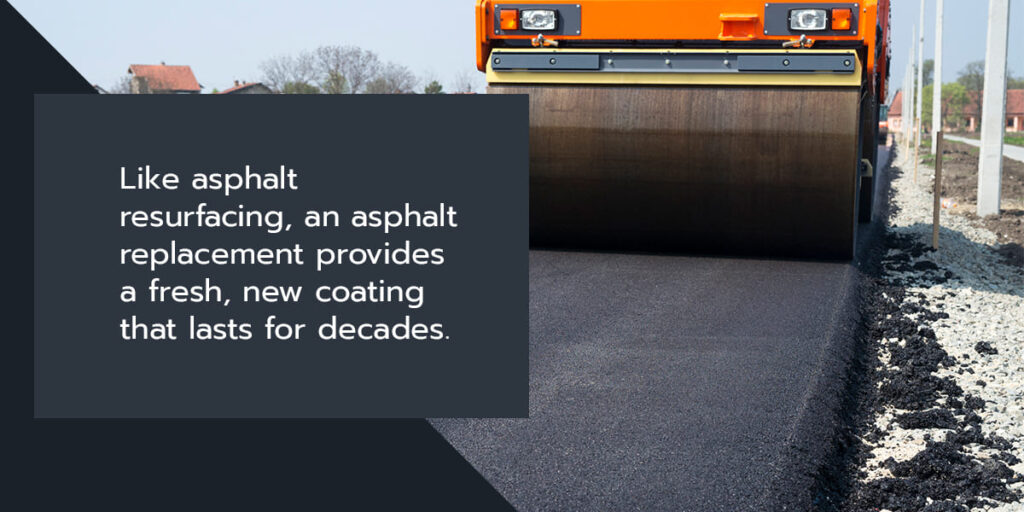
Asphalt paving replacement is a complete overhaul of a surface. It involves several different steps, starting with demolition.
Workers first break up and haul away the old pavement before grading and sloping the ground for appropriate water drainage. This step protects the pavement from flooding and water damage. After sloping and grading, they stabilize the ground with a sub-base to prevent shifting after laying the asphalt. A tack coating goes on top of the base to prime it for the next layer. The asphalt then goes on hot, is smoothed out, compacted and cured for a few hours.
Repaving asphalt is usually a good choice when:
- More than a quarter of the surface needs work.
- The foundation is unstable.
- The surface is more than 20 years old.
- There are deep cracks in the asphalt.
- You have conducted several repairs already.
Like asphalt resurfacing, an asphalt replacement provides a fresh, new coating that lasts for decades. But full repaving is the longest-lasting solution. It replaces both the foundation and the asphalt, so the current condition of your lot or its foundation is irrelevant. It offers a needed fix for many deteriorating surfaces, and it also provides a fresh new look.
Pros, Cons and Cost of Asphalt Paving Replacement
Asphalt repaving is the complete solution. When your surface has reached the end of its useful life, you’re looking at a whole replacement that starts from scratch.
Some advantages of asphalt replacements include:
- Fixing any damage: Asphalt replacements will fix even the most extensive damage, so even if your foundation is destroyed, a replacement is a viable solution.
- Covers a large surface area: There’s no concern about mismatched spots because you’re covering the entire area.
- Smooth, even finish: When considering patching vs. replacing, asphalt replacement helps you avoid the inconsistency of patches. It creates one cohesive surface that can freshen up the space.
- Curb appeal: As with resurfacing options, an asphalt replacement can add property value and create a more attractive finish for your lot and commercial landscape.
- Provides long-term value: Asphalt repaving generally lasts for around 20 years, the longest time frame of all these options. It also lets you avoid the endless cycle of repairs that might come with temporary patches or resurfacing on a poor foundation. The price of those can add up, so maximizing the value of your surface method can save you a lot of money in the future.
- Low maintenance: New pavements won’t require maintenance for many years, and you can expect very few repairs in the near future.
Though repaving asphalt has many pros, the most significant con is the cost. It is the most expensive option, so you’ll want to make sure it’s right for your property. For many business owners, the price is worth it thanks to the reduction in future repairs and the long-term value it adds.
The other notable disadvantage of asphalt repaving is that it is a more long-term investment. Depending on your organization’s finances, blacktop repaving sometimes requires long-term funding and will call for careful planning.
Asphalt Paving vs. Resurfacing vs. Patching
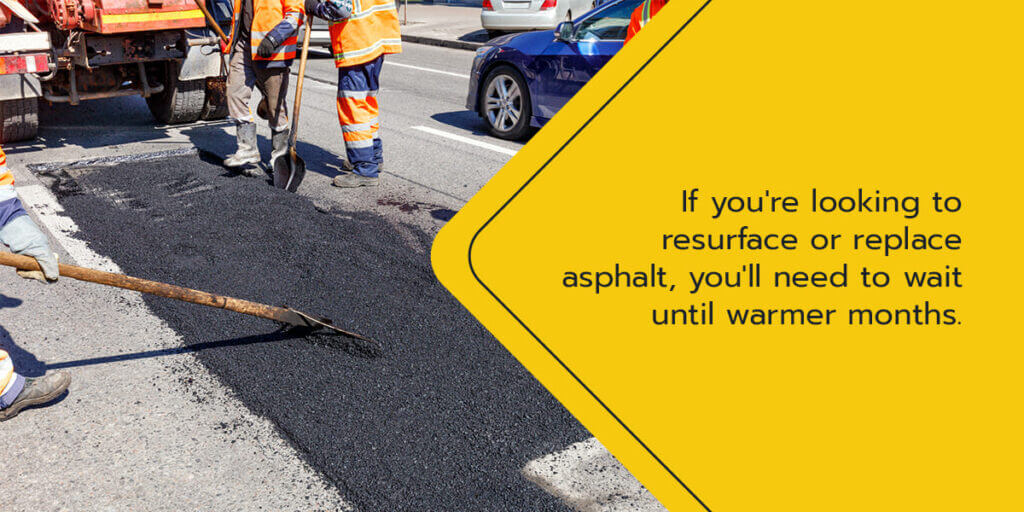
So, should you resurface or replace your driveway or lot? Whether you want to repair or replace asphalt surfaces, each of these three options can provide the right solution in the right situations. Choosing the best approach for your property depends on many different factors, such as:
- Surface condition: In what shape is the surface of the parking lot? If there are just a few shallow cracks, you likely don’t need full resurfacing, and patching can do the trick. If the asphalt has severe damage, one of those options is definitely in order. Consider how much the surface condition affects its usability. If it’s hard to drive on, more thorough repairs or a replacement could be a better choice for driving or walking on the surface.
- Foundation condition: If you know you need to fix the entire surface, but you’re still deciding between asphalt resurfacing vs. replacement, it’s good to consider the foundation’s condition. If it’s still strong, resurfacing can probably save you money and help you extend the life of the existing lot. If the foundation is deteriorating, repaving is the way to go.
- Age: A lot that’s nearing 20 years is a strong candidate for a complete replacement. If you’re having trouble on year 10, resurfacing makes a good middle ground — though many companies prefer to replace their asphalt early to avoid further repairs and get a new surface in place. If you’ve caught cracks early after paving, you can sometimes prevent them from worsening with patches. Get an expert opinion if you’re not sure.
- Budget: For some businesses, a surprise asphalt replacement cost is no big deal, but for most, it’s a significant expense. In these instances, it’s sometimes easier to delay the replacement of the pavement through resurfacing. Be careful, though, as resurfacing poor conditions will result in more repair costs down the road.
Whichever approach you take, you might wonder when to resurface your driveway or lot. You generally can’t do extensive repairs in the cold months. If you’re looking to resurface or replace asphalt, you’ll need to wait until warmer months. Hot asphalt needs warm ambient air and surface temperatures to ensure it can be worked with and cured appropriately. If you need winter repairs, there are cold patch products available that prevent further damage.
In both of the repaving vs. resurfacing options, you may also want to think about a seal coating to improve your new asphalt. Seal coatings can protect the asphalt from sun damage and liquid penetration, increase its flexibility, reduce maintenance needs, and add a jet-black finish and slip resistance.
If you’re ever not sure which option is best for your situation, consult a professional. We have years of experience evaluating asphalt and foundations and can help you determine the appropriate path for your property and business needs.
Asphalt Repair and Replacement From The Paving Lady
If you’re ready to rework your commercial asphalt in South Florida, The Paving Lady can help. We’ve been serving the area since 1985 with the help of a skilled team of pavement professionals. Whether you’re looking to protect your investment, create a fresh appearance or just fix a few issues, our experienced crew knows what to do and prioritizes quality in every job we tackle.
We can repair or replace your asphalt, as well as perform services like seal coating, line striping and markings to support the Americans with Disabilities Act (ADA) requirements.
Wondering which asphalt repair or replacement options are right for you? Reach out to us today to talk with a pro or request a quote!

